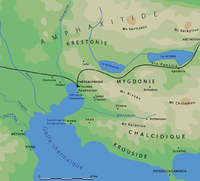Bryges

Bryges or Briges (
History

The earliest mentions of the Bryges are contained in the historical writings of
Herodotus also mentions that in 492 BC, some Thracian Brygoi or Brygians (Greek: Βρύγοι Θρήικες) fell upon the Persian camp by night, wounding
Etymology

There is no certain derivation for the name and tribal origin of the Bryges. In 1844, Hermann Müller suggested the name might be related to the same Indo-European root as that of Slavic Breg (shore, hill, slope, mountain), German Berg (mountain)[11] i.e. IE *bʰerǵʰ. It would then be cognate with Western European tribal names such as the Celtic Brigantes and the Germanic Burgundians,[12] and semantically motivated by some aspect of the word meanings "high, elevated, noble, illustrious".[13]
Proper names
Some personal or geographic names mentioned in ancient authors may be etymologically related to "Bryges":
- Brygean islands in the supposed
- Brygias or Brygium, a city in Lychnitis palus.[15]
- Brygos (son of Aphrodisios) eponym in Epidamnos/Dyrrhachion.[16][17]
- Brygos (Attic potter, 5th century BC).
- Brygindara[18] (city), Brygindis (local goddess), Brygindarios[19] (citizen) in Rhodes island.
Language
See also
- Phrygia
- Armeno-Phrygian
- Moschoi
- Macedonia
- Thrace
- Phrygian cap
References
- ISBN 0-691-00880-9, p. 65. "What can be established, despite an extremely slight archaeological record (especially along the slopes of Mt. Vermion), is that two streams of Lusatian peoples moved south in the later Bronze Age, one to settle in Hellespontine Phrygia, the other to occupy parts of western and central Macedonia."
- ^ The Gordion Excavations 1950-1973: Final Reports Volume 4, Rodney Stuart Young, Ellen L. Kohler, Gilbert Kenneth, p. 53.
- ^ Herodotus. Histories, 7.73. "The Phrygian equipment was very similar to the Paphlagonian, with only a small difference. As the Macedonians say, these Phrygians were called Briges as long as they dwelt in Europe, where they were neighbors of the Macedonians; but when they changed their home to Asia, they changed their name also and were called Phrygians. The Armenians, who are settlers from Phrygia, were armed like the Phrygians. Both these together had as their commander Artochmes, who had married a daughter of Darius."
- ISBN 0-691-00880-9, p. 65.
- ^ ISBN 978-0-521-08691-2.
- ^ Thucydides. The Peloponnesian War, 2.99.
- ISBN 0-691-00880-9, p. 65. "There is no record of conflict between the Bryges and the local population; they are described as synoikoi ("fellow inhabitant" or neighbors) of the Macedonians."
- ^ Herodotus. Histories, 6.45
- ^ Plutarch. The Parallel Lives (Brutus).
- ISBN 0-631-19807-5, p. 111. "The presence of Bryges at Epidamnus in the account of Appian seems to be confirmed by other sources, including the Coastal Voyage attributed to Scymnus of Chios and Stabo's Geography. No later record of their presence in the area survives nor can any link be established with the Bryges of Thrace..."
- ^ Müller, Hermann. Das nordische Griechenthum und die urgeschichtliche Bedeutung des Nordwestlichen Europas, p. 228.
- ^ Kluge, Etymologisches Wörterbuch, Berlin: de Gruyter 1995, v. Berg.
- ^ Pokorny, Julius. "Indogermanisches Etymologisches Woerterbuch". University of Leiden. pp. 140–141. Archived from the original on 2011-08-09.
- ISBN 0-520-07687-7, p. 223. [Glossary] "Brygean Isles: A group of islands occupying the (supposed) Adriatic delta of the Istros R. (Danube) and sacred to Artemis."
- ^ Hazlitt, William. The Classical Gazetteer: A Dictionary of Ancient Geography, Sacred and Profane. Whittaker, 1851, p. 81. "Brygias (Brygium, Brucida), capital of the Brygi, Illyria, E. of Lychnitis palus on the Via Egnatia, bet. Lychnidus (13) and Scirtiana (4). Presba."
- ^ Epigraphical Database - Epitaph of Brugos, son of Aphrodisios. White limestone cippus. Βρῦγος Ἀ[φ]ροδισίου χαῖρε.
- ^ Smith, William. Dictionary of Greek and Roman Geography, 1854 (Original from Harvard University), p. 452. "Some of the Brygi were settled in Illyricum, where they dwelt apparently north of Epidamnos. Strabo assigns to them a town Cydriae."
- ISBN 0-7100-0378-1, pp. 47-48. "The Greeks were aware that some such names had a foreign ring: it was said that the dried figs of the Brigindara region were 'barbarian' in name, though 'Attic' in the enjoyment they gave."
- ISBN 1-4179-2188-9, p. 5. "The places whose ethnics were Amios, Amnistios, Astypalaeeus, Brycuntios, Brygindarios, Casareus, Diacrios, Dryites, Erinaeus, Istanios, Neopolites, Pontoreus, Rynchidas and Sybithios were probably not in the territory of Lindos; but there is nothing to shew the position of any of these, except that Rynchidas may be the ethnic of Roncyos."
See also
- Anfosso, Milena. "The Phrygians from Βρίγες to Φρύγες: Herodotus 7.73, or the Linguistic Problems of a Migration”. In: Proceedings of the 31st Annual UCLA Indo-European Conference. November 8th and 9th, 2019. Eds. Goldstein, D. M., Jamison, S. W., Vine, B.). Bremen: Hempen Verlag, 2020. pp. 17–35.
